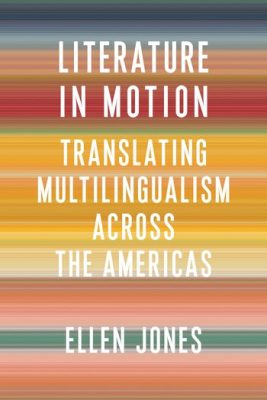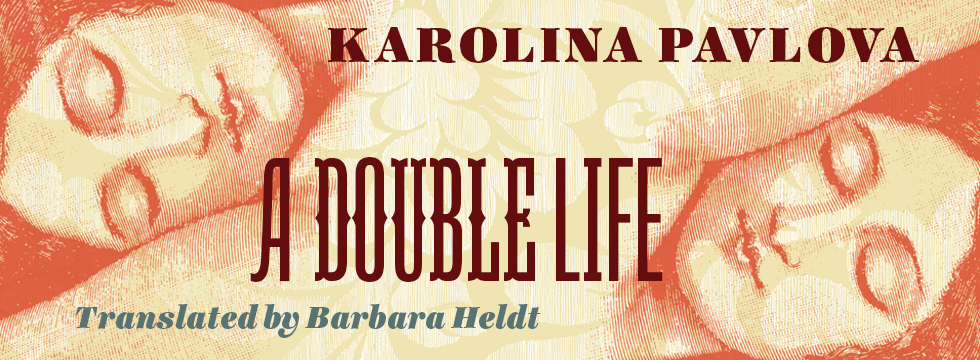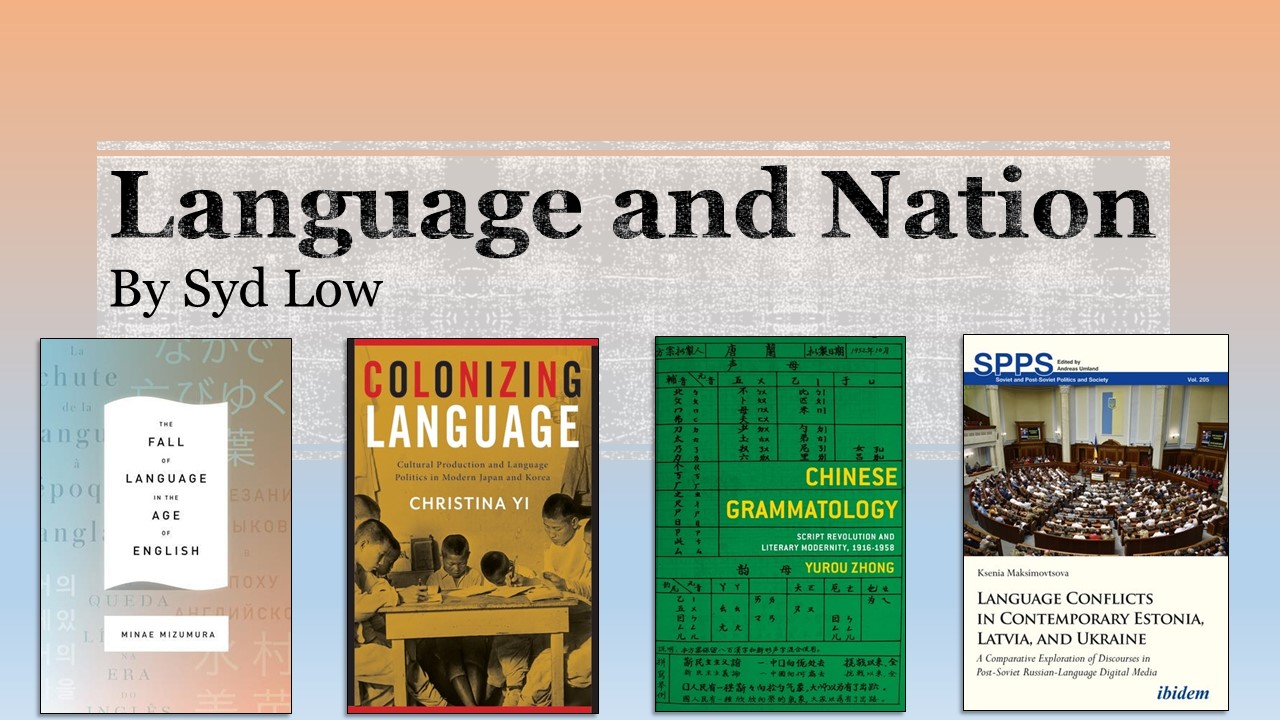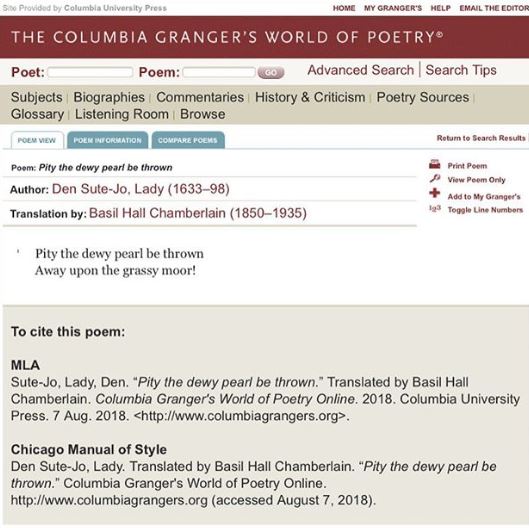Women in Translation Month 2021! A Journey from East to West By Olivia Treynor
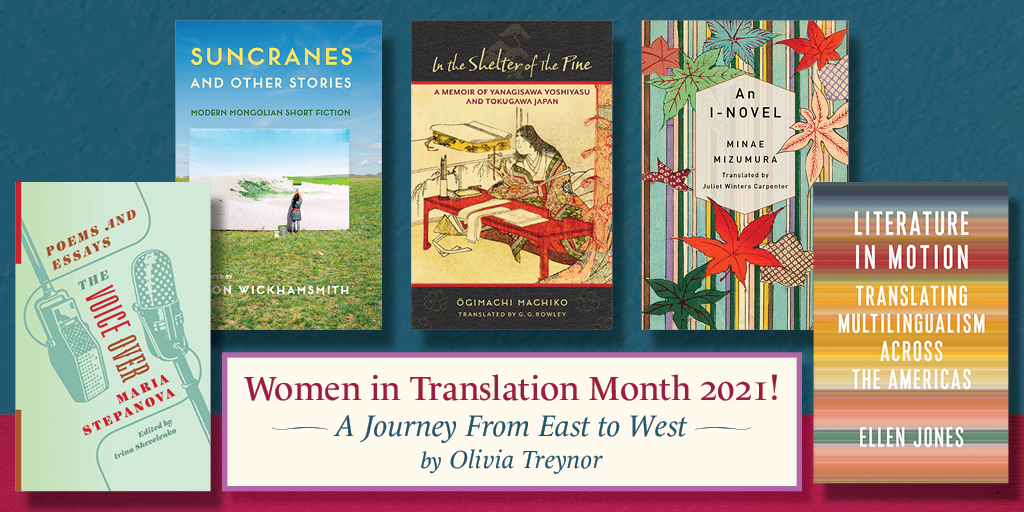
Welcome to Women in Translation Month 2021! Seven years ago, blogger and academic Meytal Radzinski took a critical look at the publishing landscape and noticed that the world of translated literature was heavily male-dominated. Reflecting on this gender disparity and wanting to create change, Radzinski started Women in Translation Month, an annual celebration of works in translation by women and other marginalized genders.
This August, we are proud to feature our 2021 batch of titles, a selection that stretches across hemispheres. We begin in Russia with The Voice Over, travel to Mongolia with Suncranes and Other Stories, continue east to Japan via In the Shelter of the Pine and An I-Novel, and finally land in the Americas with Literature in Motion.
From the Russian Library series
We’re kicking off our journey with The Voice Over, a collection of poems and essays by the highly influential Slavic poet Maria Stepanova. This translation brings Stepanova’s famously complex verse to the Anglophone world with its nuanced and innovative form intact. Long overdue, this collection introduces English readers to an essential critical voice of the post-Soviet generation.
In her post, Maria Vassileva writes about the extraordinary lengths translators go for their work. In Vassileva’s case, the work of translating meant a trip to a Roman cemetery to fact-check a spelling discrepancy from 1823. Check in this Tuesday, August 3, to read more about her adventure. In the meantime, read a piece by The Voice Over editor Irina Shevelenko, in which she unpacks passages from another one of Stepanova’s works.
Next up is Suncranes and Other Stories, a collection of short stories from Mongolia brought together by translator Simon Wickhamsmith. Wildly varied in genre and ranging from Aesopian fables to Western epics, each of these twenty-seven pieces of Mongolian prose is memorable and evocative. Read together, these works give English readers a glimpse into the expansive Mongolian creative imagination.
In his post, Wickhamsmith unpacks the national complexity of Mongolia as a historically nomadic culture adapts to an increasingly global urban landscape. The tensions and contexts Wickhamsmith describes set the backdrop from which the stories in Suncranes and Other Stories spring forth, works that respond to and emerge from their country of origin’s shifting reality. Read the post on the tradition of literature in modernizing Mongolia on Tuesday, August 10!
From the Translations from the Asian Classics series
In the Shelter of the Pine takes us to eighteenth-century Japan through the eyes of noblewoman Ōgimachi Machiko. Both a memoir of the influential samurai Yanagisawa Yoshiyasu and of Tokugawa Japan, this book provides an intimate, female perspective into daily life during a bygone era.
In her post, translator G. G. Rowley questions the lack of Japanese women’s voices from the Edo period, particularly given the rich (though nuanced) history of female voices in classic Japanese literature. She also writes of her inspiration in translating Machiko’s work and calls on scholars to seek out marginalized voices yet to be translated. You can read Rowley’s full essay on the absence of female voices in Tokugawa literature on Tuesday, August 17.
Minae Mizumura’s An I-Novel is a dynamic introduction to the Japanese literary tradition of autofiction. Her work is at once a meta-exploration of language and communication and a grounded portrait of family relationships and personal identity. At the core of the genre-defying book is a lingering question: What does it mean to be a Japanese author within the hegemony of the English language?
Mizumura’s innovative bilingual novel is masterfully translated by Juliet Winters Carpenter, allowing English-speaking readers to experience this bold confessional in all of its formal radicality. In her Q&A, Winters Carpenter writes of the unique challenge she faced when translating Mizumura’s work. Read her post on Tuesday, August 24, to learn how she brought a bilingual text into English while preserving the shock of switching between languages for the reader. In the meantime, check out Mizumura’s own Q&A to hear what the translation and collaboration process was like for her, the author.
From the Literature Now series
Our last destination is the Americas with Literature in Motion. In this work, author Ellen Jones makes a case for multilingual works as a significant site for disrupting historical hegemonies, both narrative and political. Considering the role of translation, she envisions its potential as a complementary creative strategy with multilingual texts. The implications of these efforts, Jones argues, is to further the destabilization that multilingual texts contain in their inherent resistance to dominant forms.
In her post, Jones reads An I-Novel through the lens she develops in Literature in Motion. Dissecting passages from Mizumura’s work, Jones examines the radical opportunity multilingual works in translation provide in their departure from convention. Literature in Motion is scheduled for publication in December 2021, and Jones’s post will be available to read on Tuesday, August 31, as our final installment for Women in Translation Month.
Remember to check in every Tuesday of August for a new guest blog post by one of our translators. Can’t get enough of women in translation? We are giving away one of these books to a lucky reader, so be sure to enter our drawing for your chance to win a free copy! And remember to use coupon code WITM to save 20 percent on our women in translation titles.
Categories:Asian LiteratureFictionLiterary StudiesRussian LibraryTranslationWomen in Translation
Tags:An I-NovelG. G. RowleyIn the Shelter of the PineIrina ShevelenkoJuliet Winters CarpenterLiterature in MotionMaria StepanovaMinae MizumuraŌgimachi MachikoSimon WickhamsmithSuncranes and Other StoriesThe Voice OverWITMonthWomen In Translation Month 2021

